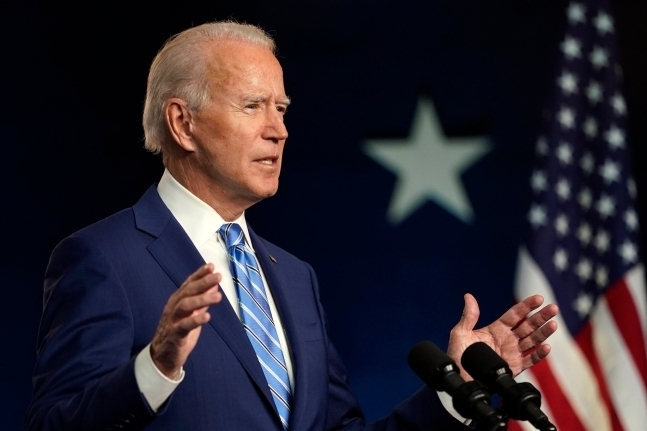The incoming Biden administration in the US would seek a bottom-up, step-by-step approach to disarming nuclear North Korea, and the policy could expand into a synergistic alliance with South Korea to bring lasting peace on the peninsula if Seoul adjusts its tune, experts here and abroad said Monday.
Biden’s predecessor Donald Trump has employed an unconventional, top-down style, dealing directly with North Korean leader Kim Jong-un and often touting a special relationship with Kim that supposedly would help the US make headway on Pyongyang’s disarmament.
“At every turn, the negotiating team under Biden will make sure to have a more concrete, actionable timeline to verify Pyongyang’s intentions to go nuclear-free, and before Pyongyang earns sanctions relief,” Choi Kang, vice president of the Asan Institute for Policy Studies in Seoul, told The Korea Herald.
It essentially means denuclearization before sanctions relief, Choi added. “It could raise trouble with Moon’s (pro-engagement) approach.”
While the Biden administration is likely to take a more prudent approach, South Korean President Moon Jae-in has been pushing to advance the Korean peace process and create a “virtuous cycle” of dialogue and improving ties with the North.
President-elect Biden will seek to encourage Moon to engage Pyongyang, but from a position of strength, after verifying its intentions or steps to disarm, according to David Maxwell, a senior fellow at the Foundation for Defense of Democracies in Washington.
But Biden would not publicly dispute Moon’s drive for a declaration to end the Korean War. Washington has not been on the same page with Seoul on the matter, with Seoul saying it would open the way for disarmament.
“On that issue, I don’t think Biden would be any different than Trump,” said Shin Beom-chul, director of the Center for Diplomacy and Security at the Korea Research Institute for National Strategy.
Shin and Choi agreed it all depends on how the Moon administration chooses to accept Biden’s way of thinking in dealing with North Korea.
“But given the past track record, Moon is unlikely to reverse its signature engagement policy. Unfortunately, time’s running out for both parties,” Choi said, explaining Moon is nearing the end of his term and Biden would be ready with his national security team by next year at the earliest.
Shin Jong-woo, a senior analyst at the Korea Defense and Security Forum, agreed on different grounds.
“Biden would be so heavily invested in the domestic agenda -- tackling the coronavirus pandemic and healing a divided America after the election -- in the first few months of his presidency that he could hardly deal with less demanding priorities like North Korea.”
Aside from such potential complications, other experts said the new Biden administration heralds some good news for Seoul-Washington relations, frayed over prolonged defense cost-sharing negotiations for the upkeep of the 28,500 American troops here.
The two allies have yet to agree on how much of the cost Seoul should bear this time.
“The Biden administration will take positions on alliance issues based on security interests rather than political expediency. This suggests a smoother cost-sharing negotiation and no major drawdown of U.S. forces in Korea,” said Leif-Eric Easley, a professor of international studies at Ewha Womans University in Seoul.
Trump has leveraged a troop cut to pressure Korea to pay a dramatic hike in its contributions to the total defense costs.
“The days of Washington trying to press Seoul for money over shared alliance costs are over. I would expect the Biden team to ask for a small increase but also want to sign a multi-year deal,” said Harry J. Kazianis, senior director of Korean Studies at the Washington-based Center for the National Interest.
By Choi Si-young (
siyoungchoi@heraldcorp.com)




![[Herald Interview] 'Trump will use tariffs as first line of defense for American manufacturing'](http://res.heraldm.com/phpwas/restmb_idxmake.php?idx=644&simg=/content/image/2024/11/26/20241126050017_0.jpg)

![[Health and care] Getting cancer young: Why cancer isn’t just an older person’s battle](http://res.heraldm.com/phpwas/restmb_idxmake.php?idx=644&simg=/content/image/2024/11/26/20241126050043_0.jpg)

![[Graphic News] International marriages on rise in Korea](http://res.heraldm.com/phpwas/restmb_idxmake.php?idx=644&simg=/content/image/2024/11/25/20241125050091_0.gif)